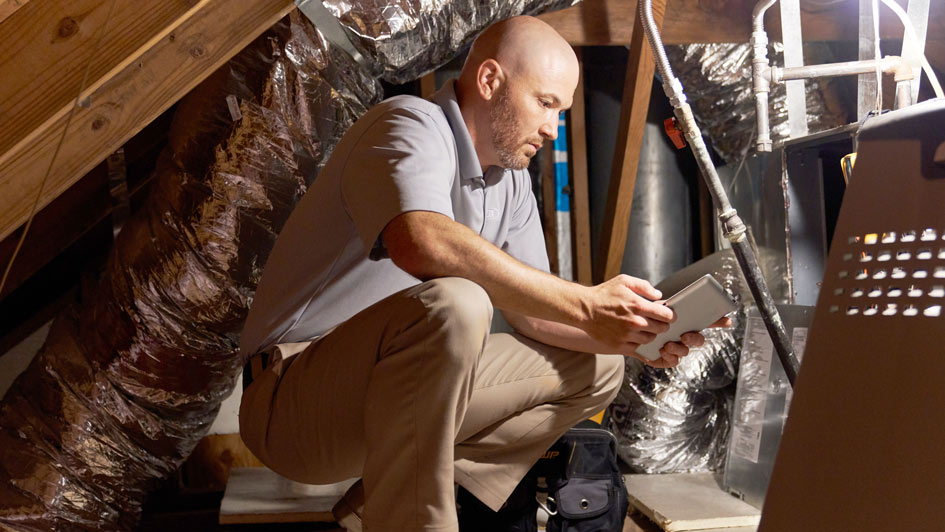
Where you aware that more than 50 percent of your home’s energy costs are needed for your heating and cooling? This is the reason why it’s so important to have an energy-efficient HVAC system.
Furnace efficiency standards were last revised to an Annual Fuel Utilization Efficiency (AFUE) rating of 80% in 2015. This rating system illustrates how effective your furnace is at natural gas into heat. An AFUE rating of 80% means your furnace loses about 20% of the fuel it uses while generating heat.
In 2022, President Biden proposed new energy-efficiency standards for residential gas furnaces that would greatly decrease emissions, save homeowners money and promote sustainability.
This proposal is anticipated to:
- Save Americans $1.9 billion annually.
- Reduce carbon emissions by 373 million metric tons and methane emissions by 5.1 million tons over 30 years, the equivalent of what 61 million homes emit each year.
Starting in 2029, the proposed rule would mandate all new gas furnaces to feature AFUE ratings of 95%. This means furnaces would turn nearly 100% of the gas into usable heat.
So what does all of this mean for your existing furnace in 2023? Currently, not much, as the proposed rule will not go into effect until 2029 at the earliest and does not affect furnaces that are already in use.
But if you need furnace replacement in soon, highly energy-efficient furnaces are now available. Learn how these furnaces can lower your monthly energy bills.
Guide to Condensing Furnaces
How Condensing Furnaces Work
A condensing furnace is a style of heating system that uses a secondary heat exchanger to collect wasted heat from the furnace's exhaust gases. This decreases the quantity of energy wasted, improves energy efficiency and lowers greenhouse gas emissions. It also demands less natural gas to create the same amount of heat in comparison to other types of furnaces.
How Condensing Furnaces Differ from Non-Condensing Furnaces
The main difference between a condensing furnace and a non-condensing furnace is that the former uses a secondary heat exchanger to capture any wasted heat from its exhaust gases, while the other does not.
Expected Longevity of a Condensing Furnace
The life span of a condensing furnace is dependent on the brand, model and other factors. Usually, a condensing furnace will last between 10-20 years with proper maintenance and regular service. If your heating system doesn’t have regular furnace maintenance, the equipment may not last as long.
Why Condensing Furnaces Require a Higher Investment
Typically, condensing furnaces enhanced precision is much more efficient than standard, single-speed furnaces, as it only utilizes the minimum amount of energy required to heat your home, saving you money in the long run.
Most variable-speed furnaces are condensing furnaces, although a handful are available in non-condensing models with lower AFUE ratings. In order for a furnace to be classified as a condensing furnace, it must offer an AFUE rating of 90% or higher.
Do Variable-Speed Furnaces Run All the Time?
A variable-speed furnace doesn’t need to stay on all the time. Alternatively, it runs at different speeds according to the temperature in your Brookfield home as well as the amount of energy it requires to maintain that temperature.
When sufficient energy is necessary to maintain your set temperature level, the furnace will shift to a higher speed in order to keep up with demand. Doing this will ensure more efficient heating in your home while also offering quieter operation.
Guide to Two-Stage Furnaces
Two-Stage Furnaces: What They Are and How They Work
A heating system with two settings of operating - high and low - is called a two-stage furnace. During the low stage, the furnace runs at a reduced capacity in order to maintain the preferred temperature at your home more efficiently. During the high stage, the furnace will instead operate at full capacity to meet demands for more heat. With a two-stage furnace, you can enjoy greater energy efficiency and steady temperatures throughout your home.
While two-stage furnaces are very efficient, not all all types are condensing furnaces.
Does a Two-Stage Furnace Operate All the Time?
A two-stage furnace should not run constantly. In the low stage of operation, the furnace performs at diminished capacity in order to retain a preferred temperature more efficiently within your home. When more energy is needed to reach the set temperature, the furnace will switch to its high stage and runs at full capacity. For this reason, two-stage furnaces are proven to help reduce energy costs without operating around the clock.
Comparing Two-Stage and Variable-Speed Furnaces
Two-stage furnaces have two stages of functionality, low and high. During the low stage, the furnace runs at reduced capacity as a way to maintain a desired level of comfort within your home. When additional warmth or cooling is desired, the furnace will switch to its high stage and operate at peak capacity.
Variable-speed furnaces, meanwhile, can work at a variety of speeds in order to sustain a desired temperature more consistently at home. Such precise functionality can also help reduce energy costs, as it is not constantly running on full power like many two-stage furnaces do.
Differences Between One- and Two-Stage Furnaces
One-stage furnaces have a single stage of operation and operate either at full power or not at all. This means that the furnace runs constantly in order to maintain a desired comfort level within your home.
Two-stage furnaces, on the other hand, have two stages of operation, low and high. While in the low stage, the furnace runs at reduced capacity in order to maintain the desired temperature more efficiently. When additional warmth or cooling is necessary, the furnace will switch to its high stage and operate at full capacity.
Make Your Furnace Installation Appointment with Central Air LLC Today
It takes experience and dedication to stay up to date about furnace technology advancements. That’s why Central Air LLC professionals are here to help with a free, no-pressure quote for furnace installation. We’ll assess your home, your heating needs and your budget before helping you find the ideal solution. Get in touch with us at 203-357-5913 to get started today!
